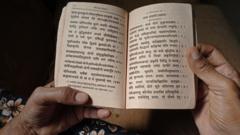In the 1950s, the US initiated a program called PL-480, allowing India to purchase American grain using local currency. Little did anyone know that this food aid would significantly influence library collections in the United States. Ananya Vajpeyi, a history scholar, reminisced about discovering the South Asia collection at the University of Chicago's Regenstein Library in 1996, describing it as unparalleled.
How India's Grain Trade Enhanced American Libraries

How India's Grain Trade Enhanced American Libraries
Through a grain exchange program, India indirectly enriched countless American universities with a wealth of South Asian literature.
This remarkable library boasts over 800,000 volumes on South Asia, thanks largely to the PL-480 initiative, aiming to alleviate food shortages in India while funding local book acquisitions for American education institutions with surplus funds. The university, along with more than 30 other US academic collections, benefited immensely as Indian libraries also struggled with resource preservation and accessibility, which only widened the knowledge gap over time.
As the program concluded in the 1980s, American libraries transitioned to funding their acquisitions directly, leading to substantial annual expenses. Yet, many scholars, like Vajpeyi, believe the exchange fostered a fruitful academic environment in the US that continues to influence research across various disciplines. In contrast, Indian libraries still battle neglect and preservation challenges, underscoring the disparities in access to these crucial resources today.
India's food assistance program has created a legacy of knowledge and literature in Western institutions.
Until the mid-20th century, India grappled with significant food scarcity challenges, prompting initiatives like the US PL-480 program, which allowed India to use local currency to procure American grain. The program had an unexpected consequence, leading to the acquisition of South Asian books for several American universities, thereby enriching their library collections.
The Regenstein Library at the University of Chicago stands out, boasting one of the largest South Asia collections globally. Ananya Vajpeyi, a history PhD student in the 1990s, recalled her awe at the vast resources available there, which began to develop in the late 1950s due to PL-480 funding. Special teams in Delhi were established to curate books across multiple languages, addressing the logistical complexities of India’s diverse publishing landscape.
Initially focused on government publications, the program widened its scope to include significant literary works. By the late 1960s, American universities had received over 750,000 books and periodicals from the subcontinent. Some scholars express concern that this resulted in the depletion of Indian literary resources, creating knowledge gaps as local researchers now often travel to the West for materials unavailable in India.
On top of the acquisition challenges, many of the books originally obtained through PL-480 continue to exist in American libraries, but many have deteriorated in India due to preservation issues. Current initiatives depend heavily on US funding to maintain and grow these collections. Ultimately, the legacies of PL-480 highlight the complex, intertwined histories of food aid, literary access, and academic growth across continents.
As the program concluded in the 1980s, American libraries transitioned to funding their acquisitions directly, leading to substantial annual expenses. Yet, many scholars, like Vajpeyi, believe the exchange fostered a fruitful academic environment in the US that continues to influence research across various disciplines. In contrast, Indian libraries still battle neglect and preservation challenges, underscoring the disparities in access to these crucial resources today.
India's food assistance program has created a legacy of knowledge and literature in Western institutions.
Until the mid-20th century, India grappled with significant food scarcity challenges, prompting initiatives like the US PL-480 program, which allowed India to use local currency to procure American grain. The program had an unexpected consequence, leading to the acquisition of South Asian books for several American universities, thereby enriching their library collections.
The Regenstein Library at the University of Chicago stands out, boasting one of the largest South Asia collections globally. Ananya Vajpeyi, a history PhD student in the 1990s, recalled her awe at the vast resources available there, which began to develop in the late 1950s due to PL-480 funding. Special teams in Delhi were established to curate books across multiple languages, addressing the logistical complexities of India’s diverse publishing landscape.
Initially focused on government publications, the program widened its scope to include significant literary works. By the late 1960s, American universities had received over 750,000 books and periodicals from the subcontinent. Some scholars express concern that this resulted in the depletion of Indian literary resources, creating knowledge gaps as local researchers now often travel to the West for materials unavailable in India.
On top of the acquisition challenges, many of the books originally obtained through PL-480 continue to exist in American libraries, but many have deteriorated in India due to preservation issues. Current initiatives depend heavily on US funding to maintain and grow these collections. Ultimately, the legacies of PL-480 highlight the complex, intertwined histories of food aid, literary access, and academic growth across continents.





















